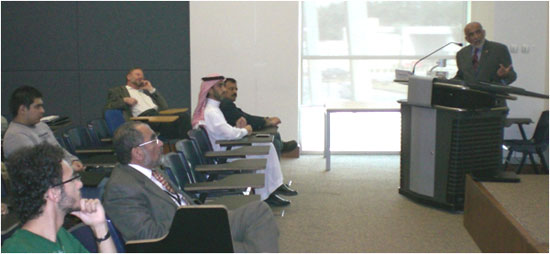Coronary artery ischemic diseases can reduce, or totally block, blood flow/oxygen to the rest of the heart causing ischemia, chest pain and acute infarction. Biological memory reflects an increased tolerance of a subject, an organ or cells to sustained stress with prior exposure to a brief period of stress. Stress is translated to chemical triggers which initiate mechanisms of signal transduction and stimulate nuclear activities to produce protective factors and proteins.

Dr. Anwar Abdulfatah, a Professor in the College of Medicine at Alfaisal University, gave a stimulating and informative talk entitled ‘Biological Explanation for the Adaptive Response “Memory” against Stress and Disease: Lessons Learned from the Heart, as part of the Research Colloquium lecture series on Wednesday 20 January 2010 at Alfaisal University.
Although reperfusion is mandatory for myocardial salvage/survival, it adds more injury mediated by free radical production. Selective inhibition of the es-ENT1 nucleoside transporter protein attenuates reperfusion-mediated injury in on and off pump. Pharmacologic targeting of reperfusion injury has important clinical relevance in patients with pre-existing ischemic syndromes undergoing coronary interventions and surgical revascularization.
Dr. Anwar obtained his PhD from Mississippi State University in 1979. He has also held academic appointments at the Duke University Medical Center and at the Virginia Commonwealth University. His research interests include Cardiothoracic Surgery, Mechanisms of Post-Ischemic Reperfusion Injury and Protection, Cardio-protection of Immature Hearts, Cardio-protection of Diseased Hearts undergoing Cardiac Surgery and Cardio-protection of Beating and Non-Beating Hearts for Heart Transplantation














